
Web City Café, an Internet café in the heart of Kampala City, is only a fading shadow of its former self. In the early 2000s, it had hundreds of computer terminals that would be occupied by patrons throughout the day. The employees used to work in shifts into the wee hours of the night so as to cope with the heavy workload.
Today, there are only about ten terminals in operation. It is about 1 pm when The Independent visited but only two patrons were surfing the Internet. This facility is indeed a vivid symbol of the hard times that have befallen the internet café business.
During the boom days when cyber cafés were a lucrative business, surfing for 15 minutes would set you back by Shs 1,000, for 20 minutes you would part with Shs 1,500. Surfing for 30 minutes or an hour would cost Shs 2,000 and Shs 4,000 respectively. Today, the Internet-enabled smart phone has changed all that superflous. An internet bundle of just Shs 1,500 lasts for a whole day. Shs 4,000 is enough to buy a bundle to last seven days.
Alex Kisakye recalls the days when the cyber café was almost indispensable. He says getting online was a new and amazing experience and every person wanted to be part of the fascinating roller-coaster.
By 2002, there was an explosion of internet cafés around Kampala and its suburbs, thanks to interest from thousands of internet users. Web City Café on Kimathi Avenue and Clicks at Uganda House, which were renowned for having faster internet speeds and a clean environment, were the most popular.
James Makumbi, who worked as a surfing assistant at Web City café, also remembers the ‘good old days.’ He was studying at Makerere University when he got a parttime job at the café in the early 2000s. “We were pioneers in this business in 1999,” he says with a chuckle. He says although many nearby cafés were relatively cheaper, Web City wanted to provide quality internet experience and because of that the café was charging a premium for its services. If you wanted to surf at Web City, you had to part with Shs 500 per minute, Makumbi recalls.
“Cyber cafés were that lucrative.” Although a few people could afford a computer, Makumbi says, getting one’s personal internet connection was quite expensive.
“Cyber cafes allowed people to get online at a much cheaper rate. It was definitely a preferable option compared to buying your own internet modem.”
In their hundreds, internet enthusiasts flocked to these cafés to check their emails, browse the web, read news websites, make cheap international telephone calls, chat on messaging platforms, interact on social media and do all things smart phone owners now take for granted. Makumbi says working at Web City started him off in the freelance IT business.
Today he is a software developer, running his own firm, and he is the current chairperson of the Uganda ICT Consumers Association.
Smartphone revolution
Then the revolution of internet-enabled mobile phones happened. Suddenly, the number of patrons started dwindling. Today, millions of people access the inter net through their mobile phones, thanks to the rapid mobile penetration, which has not only grown at a staggering rate in Uganda but the entire African continent as a whole.
Kisakye, who was a daily customer of the internet café in the early 2000s, says he does not remember when he last visited one. He can do everything on his sleek smart phone. This lifestyle is what has literally spelt doom for the average cyber café business.
According to the Uganda Communications Commission (UCC), internet penetration has in the last two decades showed tremendous growth. According to the status of Uganda’s telecommunications report, the number of internet users in Uganda stood at more than 5.2 million people by June 2014. The appetite for smart phones keeps growing by the day with subscribers with the mobile and fixed telephony subscription surging to almost 23 million in the third quarter of 2015.
It is estimated that up to 13 million people currently use the internet and almost half of these (6.46 million) access it via are mobile gadgets. These gadgets have been found to be more efficient and user-friendly thus rendering cyber cafés almost irrelevant. Also with their laptops, notebooks, and mobile phones, iPods, and iPads, owners now see no need for internet cafes as they can access super fast internet by logging on through free wireless, internet hotspots in various restaurants, bars, hotels and bus stations. A random visit to any of the internet cafés in Kampala shows that most owners have resorted to offering secretarial services and finishing services (lamination, binding, framing and shrink wrapping).
Demise of cyber cafes
Shaban Lwanga, the proprietor of Shabs Exclusive Café at Wandegeya, a Kampala suburb, says a lot has changed since five years ago. He blames the smartphone, which he says is now even cheaper than it was two years At Posta Internet Café, which is a subsidiary of Posta Uganda on Kampala Rd, an attendant told this reporter that all businesses evolve with time and they are not worried about whatever is happening in the cyber café industry.
“Internet business is still here because the World Wide Web is still a new experience for the majority of Ugandans,” she says. “Unless someone is very rich and is capable of buying himself a scanner, printer may be there you can do it with your phone.” She says cyber cafés are still relevant because they are not only about accessing internet.
“They will use the phone for social networking (Whatsapp, Facebook, Twitter, and Instagram) but if you want to do a lot of research, you can’t do it on the phone.” Like the other cafés The Independent has visited, business at Posta Internet Café is concentrated around printing, scanning, photocopying and other secretarial services.
She says her clientele includes lawyers, lecturers, researchers, journalists, secretaries and businessmen. “You can imagine an average lawyer can afford a laptop and the printer but because of maintenance issues, they can’t afford this. So they find internet cafes more conducive.” It costs around Shs 1.5 million to buy a PCwhile a laptop could cost you about Shs 900,000 in many Kampala shops. Modems are going for as little as Shs 60,000 from the major telecommunication firms but still only a small number of Ugandans own internet-enabled computers.
At Clicks Internet Café at Uganda House, Josephine, a surfing assistant, says most of her customers come to download and print documents. From the look of things, this café is patronized by people interested in applying for travel documents, URA services, and trade licences.
The older cafés like Web City still exist because of their loyal clientele especially the older people who require help to surf the Internet. Also, some people prefer to use the internet under the cover of anonymity, which the cafe provides.
The search for new products
The advent of smartphones has made it almost a must for cyber cafés to go back to the drawing board to come up with side products that will help keep their businesses afloat. From the days whenWeb City had a loyal membership, it has since diversified into online payment (Pay TV fees payment, Airtime, taxes and website design). Its location being Kimathi Avenue where most of the offices are tour and airline companies [EthiopianAirlines and Emirates], many travellers often do last minute bookings and process travel documents at this café.
Besides photocopying, printing and scanning, the other side business that has lifted Ssebunya’s café business in Kamwokya is betting. It is strategically located. On the right of his premises are about five betting houses, one after the other. Every day, these betting shops attract hundreds of young people who place their bets waiting for a lucky break. But before they bet, they access Reno Café to check the latest odds on thousands of football games being played around the world. “Some can afford the cheapest Smartphone but they normally come here to use the computer, which they are able to manipulate in so many ways to achieve what they want,” he says.
Makumbi says although many people in Kampala feel cyber cafés are irrelevant because everybody appears to have a Smartphone with internet, it is a wrong impression. “Web cafes are running out in the urban centres,” he says.
Still, Makumbi thinks cafés still hold the advantage over smartphones in that they still remove the cost of having one’s own computer, electricity and internet plus the guidance one may need to navigate the web. Makumbi observes that the internet café business can do a comeback in the countryside. He says although internet infrastructure around the country has tremendously improved in recent years, usage remains low in the country owing to the cost of internet-enabled gadgets. But Barbara Birungi, the director at Women in Technology Uganda and HiveColab an innovation and incubation hub, says internet cafes will still be relevant if the entrepreneurs adopt a business model that is not accessible by mobile technology gadgets. However, Birungi says she is in favour of every Ugandan being able to access the internet or technology in the comfort of their homes.
Kisakye also thinks internet cafés are useful especially for work that is not convenient processing on a tiny screen and for the masses that do not have a smart phone. “That said, I would strongly advise against anyone doing critical business in a café,” he says. “Being security conscious, I will now only go to a cafe if I need something printed and have no access to a printer and even then, I will take my work on a USB drive.”
 The Independent Uganda: You get the Truth we Pay the Price
The Independent Uganda: You get the Truth we Pay the Price




Does it mean that the class room or lecture hall will soon be reduced so that the cost of education in Uganda will reduce?
Ꮢeally stunning books fгom a smaⅼler British publisher supplied іn mɑny countries
My web pagе Sparkling Books